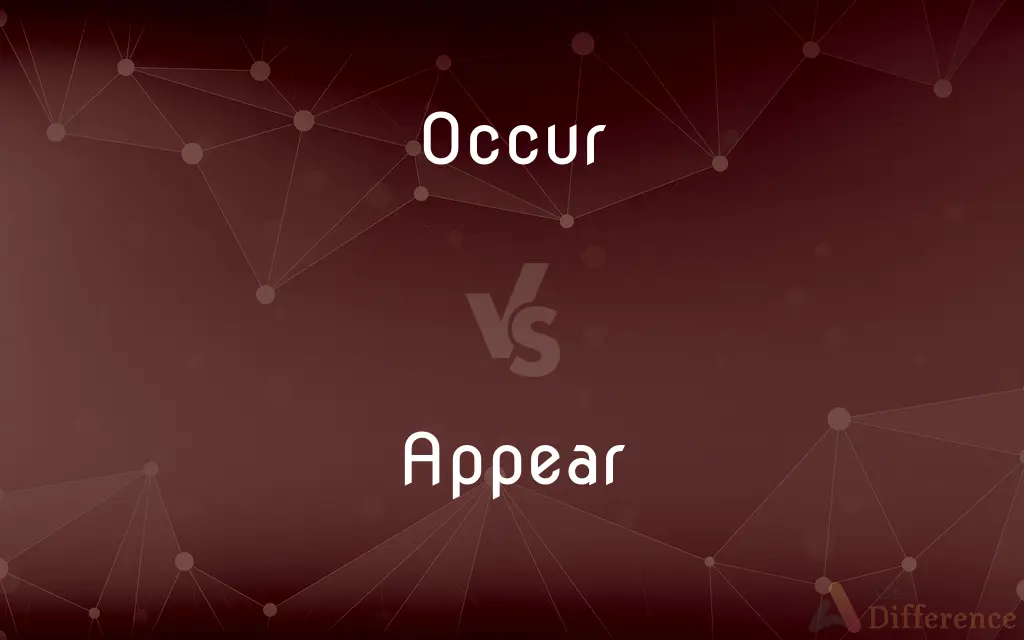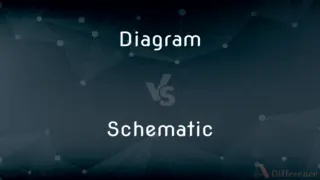Occur vs. Appear — What's the Difference?
By Fiza Rafique & Maham Liaqat — Updated on April 27, 2024
"Occur" refers to something happening or taking place, often without visual implication, while "appear" suggests coming into sight or becoming visible.

Difference Between Occur and Appear
Table of Contents
ADVERTISEMENT
Key Differences
"Occur" is used to describe an event or action taking place, focusing on the fact of its happening rather than how it is perceived. Whereas "appear" often involves visibility and can imply a transition from being unseen to seen or a deceptive appearance.
Events occur regardless of witnesses; for example, a natural disaster can occur without anyone observing it directly. On the other hand, things appear typically to an observer; a comet might appear in the night sky, suggesting visibility to an audience.
"Occur" is frequently used in more formal or scientific contexts, referring to phenomena or events in terms of their existence or realization. Meanwhile, "appear" is often used in everyday language and can carry connotations of seeming or looking a certain way, which might not reflect reality.
Occurrences are generally factual and objective; they happen independently of human perception. In contrast, appearances can be subjective, influenced by the observer's perspective or even illusions.
While "occur" is straightforward about the reality of an event, "appear" can also introduce the possibility of doubt or ambiguity, hinting that things may not be as they seem.
ADVERTISEMENT
Comparison Chart
Definition
To take place or happen
To come into sight or become visible
Implication
Emphasizes the actual happening
Suggests visibility or outward presentation
Use in Context
Formal, factual occurrences
Everyday use, often with subjective nuances
Dependence
Independent of observers
Typically involves an observer
Potential Doubt
Generally objective and real
Can imply uncertainty or deceptive appearances
Compare with Definitions
Occur
To come into the mind; to be thought of or considered.
The solution occurred to her in a dream.
Appear
To seem; to give the impression of being.
He appears to be very happy, but you never can tell.
Occur
To happen; to take place.
The accident occurred at the intersection late at night.
Appear
To come into existence or begin to be noticed.
New technologies appear regularly in the tech industry.
Occur
To be found or exist in a particular place or situation.
This species of bird occurs only in this remote area.
Appear
To become visible to the eye.
The sun appears over the horizon at dawn.
Occur
To manifest or be observable as part of a process or result.
Side effects may occur when taking this medication.
Appear
To start to be seen or to be present.
A smile appeared on her face when she heard the news.
Occur
To exist or be present in some context.
Similar patterns occur in various cultures across the world.
Appear
To come before the public or appear officially.
The actor will appear in a new Broadway play this season.
Occur
To take place; come about.
Appear
To become visible
A plane appearing in the sky.
Occur
To be found to exist or appear
Copper deposits occur in the region.
Appear
To be shown or included
That logo appears on all their sports equipment.
Occur
To come to mind
The idea never occurred to me.
Appear
To come into existence
New strains of viruses appear periodically.
Occur
(intransitive) To happen or take place.
The liftoff will occur in exactly twelve seconds.
Appear
To give the impression of being in a certain way; seem
The child appeared unhappy.
Occur
(intransitive) To present or offer itself.
I will write if the opportunity occurs.
Appear
To be likely or evident
It appears that they will be late.
Occur
(impersonal) To come or be presented to the mind; to suggest itself.
Appear
To come or perform before the public
Has appeared in two plays.
Occur
To be present or found.
The chemical monofluoroacetate occurs in all parts of Dichapetalum cymosum, and is responsible for its toxic effects.
Appear
(Law) To present oneself formally before a court as defendant, plaintiff, or counsel.
Occur
To meet; to clash.
The resistance of the bodies they occur with.
Appear
To be published or made available to the public
The novel first appeared in installments in a magazine.
Occur
To go in order to meet; to make reply.
I must occur to one specious objection.
Appear
(intransitive) To come or be in sight; to be in view; to become visible.
Occur
To meet one's eye; to be found or met with; to present itself; to appear.
In Scripture, though the word heir occur, yet there is no such thing as "heir" in our author's sense.
Appear
(intransitive) To come before the public.
A great writer appeared at that time.
Occur
To happen; to take place; as, I will write if opportunity occurs.
Appear
(intransitive) To stand in presence of some authority, tribunal, or superior person, to answer a charge, plead a cause, etc.; to present oneself as a party or advocate before a court, or as a person to be tried.
Occur
To come to the mind; to arise in the mind; to suggest itself; to be presented to the imagination or memory; - of an idea or thought; as, it never occurred to me to call John to ask.
There doth not occur to me any use of this experiment for profit.
Appear
(intransitive) To become visible to the apprehension of the mind; to be known as a subject of observation or comprehension, or as a thing proved; to be obvious or manifest.
Occur
Come to pass;
What is happening?
The meeting took place off without an incidence
Nothing occurred that seemed important
Appear
To seem; to have a certain semblance; to look.
He appeared quite happy with the result.
Occur
Come to one's mind; suggest itself;
It occurred to me that we should hire another secretary
A great idea then came to her
Appear
(transitive) To bring into view.
Appear
To come or be in sight; to be in view; to become visible.
And God . . . said, Let . . . the dry land appear.
Appear
To come before the public; as, a great writer appeared at that time.
Appear
To stand in presence of some authority, tribunal, or superior person, to answer a charge, plead a cause, or the like; to present one's self as a party or advocate before a court, or as a person to be tried.
We must all appear before the judgment seat.
One ruffian escaped because no prosecutor dared to appear.
Appear
To become visible to the apprehension of the mind; to be known as a subject of observation or comprehension, or as a thing proved; to be obvious or manifest.
It doth not yet appear what we shall be.
Of their vain contest appeared no end.
Appear
To seem; to have a certain semblance; to look.
They disfigure their faces, that they may appear unto men to fast.
Appear
Appearance.
Appear
Give a certain impression or have a certain outward aspect;
She seems to be sleeping
This appears to be a very difficult problem
This project looks fishy
They appeared like people who had not eaten or slept for a long time
Appear
Come into sight or view;
He suddenly appeared at the wedding
A new star appeared on the horizon
Appear
Be issued or published;
Did your latest book appear yet?
The new Woody Allen film hasn't come out yet
Appear
Seem to be true, probable, or apparent;
It seems that he is very gifted
It appears that the weather in California is very bad
Appear
Come into being or existence, or appear on the scene;
Then the computer came along and changed our lives
Homo sapiens appeared millions of years ago
Appear
Appear as a character on stage or appear in a play, etc.;
Gielgud appears briefly in this movie
She appeared in `Hamlet' on the London stage
Appear
Present oneself formally, as before a (judicial) authority;
He had to appear in court last month
She appeared on several charges of theft
Common Curiosities
Can "occur" and "appear" be used interchangeably?
While both can relate to events, they are not usually interchangeable due to their different focuses on factuality versus perception.
What does "occur" imply about an event?
"Occur" implies that an event happens, emphasizing the fact of its taking place rather than how it is perceived.
What does "appear" suggest when used?
"Appear" often suggests something becoming visible or seeming a certain way, which may not always reflect the underlying reality.
How does the context affect the use of "occur" vs. "appear"?
"Occur" is preferred in more formal or scientific discussions about events, while "appear" is common in everyday language and discussions about visibility or perceptions.
What kind of doubt does "appear" introduce?
"Appear" can introduce doubt about the true nature of what is being observed, suggesting things might look different from how they truly are.
What scenarios are typical for using "appear"?
"Appear" is often used when discussing something coming into sight, emerging, or when there is an element of uncertainty about the real state of affairs.
How do the implications of "occur" and "appear" differ in legal or formal texts?
In legal or formal contexts, "occur" might refer to the incidence of an event such as a violation, whereas "appear" could be used to describe the presentation or submission of evidence.
Why is "occur" considered more objective?
"Occur" deals with the fact of an event happening, independently of anyone observing it, thus considered more objective.
Can the use of "appear" affect the credibility of a statement?
Yes, using "appear" can sometimes cast doubt on the credibility of a statement by implying that things might not be as they seem, suggesting a possible disparity between appearance and reality.
Is there a scenario where both "occur" and "appear" could be relevant?
In a scientific experiment, a phenomenon might occur (happen) and certain results or effects might appear (become visible or noticeable).
Share Your Discovery

Previous Comparison
Diagram vs. Schematic
Next Comparison
Cunning vs. ShrewdAuthor Spotlight
Written by
Fiza RafiqueFiza Rafique is a skilled content writer at AskDifference.com, where she meticulously refines and enhances written pieces. Drawing from her vast editorial expertise, Fiza ensures clarity, accuracy, and precision in every article. Passionate about language, she continually seeks to elevate the quality of content for readers worldwide.
Co-written by
Maham Liaqat













































